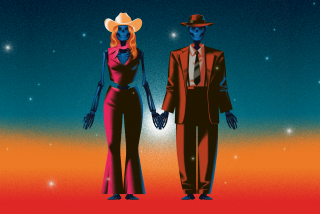Chess’ pride and sorrow
- Share via
Bobby Fischer, who died a melancholy exile’s death Friday at age 64, was that most perplexing of human characters -- a protean genius and a repellent man. He was to American chess what Ezra Pound was to American poetry.
Nearly four decades ago, in the summer of 1972, Fischer was something more -- a participant in what then seemed to be the ultimate contest between American individualism and Soviet collectivism. When he went to Reykjavik, Iceland, to play Russian grandmaster Boris Spassky for the world championship, the 29-year-old Fischer was everything an American hero was supposed to be: the son of a hardworking single mother, a self-made grandmaster who had taught himself the game from the instructions that came with a chess set purchased in the candy store downstairs from his Brooklyn apartment.
Spassky was a quintessential representative of the vast Soviet chess establishment, which included institutes devoted to the study of the game and that treated its successful players as national heroes. He arrived in Iceland as the reigning world champion, accompanied by physical therapists, chefs, a tennis partner and dozens of coaches and grandmasters to help him analyze Fischer’s every move.
The notoriously eccentric Fischer -- whose antipathy toward the Soviets was storied -- skipped the opening ceremony and had to be coaxed back into playing at all by a phone call from Henry Kissinger, who appealed to his patriotism. Fischer lost the first two games, then went on to crush Spassky in a match that ushered in a new global enthusiasm for chess.
It was a high-water mark for both Fischer and the illusion that sports could somehow become a nonviolent venue into which the competition between the world’s political systems could be channeled. Shortly afterward, Palestinian terrorists kidnapped and killed Israeli athletes at the Munich Olympics, and that illusion was dead forever.
Fischer gave up his title without ever defending it. Most of his remaining years were given over to crank religiosity and paranoid bigotry. Despite the fact that his mother and, probably, his biological father were Jews, Fischer became a Holocaust denier and an ever more virulent anti-Semite. He lived for many years in a series of increasingly shabby Pasadena apartments and hotel rooms near his church’s headquarters. In 1981, he was arrested there because he matched a bank robber’s description and refused to give police his name.
In 1992, Fischer became a fugitive from U.S. justice when he violated the embargo against Serbia to play his only post-Reykjavik match -- a shabby rematch with the has-been Spassky. On the run, he made more viciously anti-Semitic and anti-American radio broadcasts, ended up under arrest in Japan and finally was granted citizenship and refuge back in Iceland, where he died.
In his great meditation on genius, Yeats wrote: The intellect of man is forced to choose / Perfection of the life, or of the work.
Putting aside the question of whether the mad ever really act of their own accord, let’s assume for one moment that Fischer chose perfection of his work, and let us consider him accordingly.
The British grandmaster Raymond Keene said Friday that Fischer “was the pride and sorrow of chess. It’s tragic that such a great man descended into madness and anti-Semitism.” Yet even within that unquestionable greatness, there is a strange, sad solitude.
Most great chess players have an encyclopedic knowledge of their sport’s historic matches. Over the years, several of the accomplished players who worked with Fischer expressed surprise that he had a precise memory only of the matches he’d played himself. His 1969 book is considered one of the true classics in the vast literature of chess. Its title? “My 60 Memorable Games.”
Fischer’s contributions to chess theory are original and numerous. Oddly, though, those remarkable innovations almost all involve openings. Though he was a player so consumed with winning that his disdain for even a strategic draw was legendary, only a single endgame bears Fischer’s name.
Although his sixth game against Spassky in 1972 has been compared to a Mozart symphony, many analysts believe that his greatest game was in 1956, when the then-13-year-old prodigy defeated Donald Byrne, a leading U.S. chess player, with a breathtakingly audacious queen sacrifice.
Fischer would go on to sacrifice nearly everything that makes life -- however imperfect -- worth living: family, friends, faith, country, a decent regard for other people and, finally, reason itself. Idiosyncrasy became eccentricity, and eccentricity became ordinary madness. In the end, as the darkness gathered, there was no one left around him willing or able to strike a consoling light.
When you willfully set the board like that, the outcome seems preordained. The 20th century’s great anti-heroic bard, Samuel Beckett, wrote Bobby Fischer’s epitaph:
“There is no endgame between a man and his fate.”
--
More to Read
Go beyond the scoreboard
Get the latest on L.A.'s teams in the daily Sports Report newsletter.
You may occasionally receive promotional content from the Los Angeles Times.










